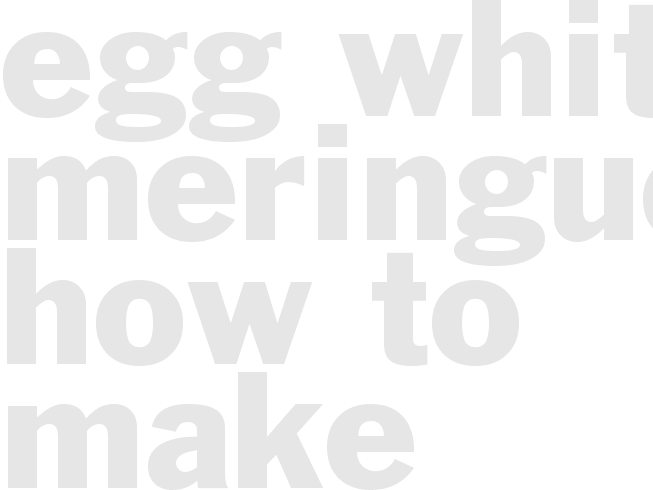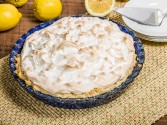↞ recipe box start page
 Category: Desserts
Category: Desserts
Prep Time: Cook Time: Total Time:
Whipping egg whites are much like blowing air into a balloon. Beating or whisking causes the protein in the egg whites to unfold, forming films that trap the air bubbles, and the sugar stiffens the foam. A meringue is really nothing but a foam, and foam is a big collection of bubbles.
Age of Eggs:
Meringue recipes work better with eggs that are at least 3 or 4 days old. Thin, older egg whites whip more easily to a higher volume than thick, fresh egg whites. Once whipped, the foam from thin whites is less stable because the liquid film drains more easily from the bubbles. If volume is more important than stability, then older eggs are better to use. For better stability, a good rule of thumb is to use fresher eggs for meringues, saving older ones for general baking.
Don't make egg white meringues on a rainy or really humid day (remember that they are mostly air and if that air contains a lot of water, it will have an effect).
Separating Eggs:
Cold eggs separate more easily than those at room temperature because the whites hold together better.
To separate an egg: Crack the egg and hold the shell halves over a bowl. Transfer the yolk back and forth between the halves, letting the white drop into the bowl. Do not cut the yolk (whites containing any yolk will not beat properly). Transfer the yolk to another bowl.
The tiniest bit of fat or egg yolk will wreck a meringue, as fat interferes with the formation of good foam. When separating eggs, if a speck of egg yolk falls into the egg whites, lift it out with an empty eggshell half. Do not try to fish it out with your fingers; the oil on your skin will prevent the egg whites from expanding.
Avoid letting your fingers touch the areas that will come in contact with the egg whites. That way, you'll avoid leaving oils from your hands on the utensils you just washed.
Room Temperature: After separating, bring egg whites to room temperature to ensure volume when beating (as warmer eggs whip faster than cold eggs). Egg whites right out of the refrigerator will not whip well. The ideal temperature to whip a common meringue is room temperature, about 70 degrees F. (21 degrees C.). Usually 30 minutes is adequate to obtain room temperature.
A beaten egg white can foam to 6 to 8 times its original volume if the egg whites have been at room temperature for 30 minutes before beating.
Bowls and Utensils:
Copper, stainless-steel, or glass bowls work best for making meringues. Avoid using plastic bowls for whipping egg whites as they can often harbor traces of grease or fat, which prevents the whites from getting stiff. Whichever type of bowl you use, be sure it is spotlessly clean.
Make sure that all your utensils are immaculately clean, completely grease-free, and completely dry. Meringues are very sensitive and they don't like any moisture.
Place the egg whites into a large, tall bowl and set your mixer to medium-high speed. NOTE: I would not hand beat a meringues (too much work). Beating or whisking causes the protein in the egg whites to unfold, forming films that trap the air bubbles, and the sugar stiffens the foam. As the mixing time increases, the bubbles become smaller and more numerous; this increases the volume and makes a more-stable structure.
Adding Sugar:
Do not add sugar before whipping the egg whites. Adding sugar at the beginning can double the time you have to whip the egg whites to get a foam. Add the sugar at the very end when the whites have formed soft peaks.
I like to use superfine sugar when making meringue because it dissolves faster than table sugar. When beating egg whites and the recipe calls for sugar, Gradually add the sugar, a few spoonfuls at a time and beating the whole time.
As a general rule, add a total of 1/4 cup of granulated or superfine sugar for each egg white. Do not make meringues that have less than 2 tablespoons of sugar per egg white. If you use any less, the foam will not set and the meringue will shrink.
To tell if the sugar is dissolved when you are beating egg whites for meringues, rub a bit of the foam between your fingers. If it feels gritty, the sugar is not dissolved, so keep beating for a few minutes.
By varying the amount of sugar in the final mix, you control how hard or soft the final meringue will be:
For soft peaks - place egg whites in a clean glass or metal bowl (not plastic), and beat with an electric mixer on medium speed or with a rotary beater until egg whites form peaks with tips that curl over when the beaters are lifted. For stiff peaks, continue beating egg whites on high speed until they form peaks with tips that stand straight when the beaters are lifted.
For stiff peaks - continue beating egg whites on high speed until they form peaks with tips that stand straight when the beaters are lifted.
Once you start a making whipped egg whites, continue it straight through and finish it off. Do not stop halfway to take a break
The meringue is done when it is not runny and when you can hold a spoonful of it upside down and none of it drops off. Also when you swirl a spoon through it and the swirls hold their shape indefinitely.
Using Meringue:
Make the meringue first - then prepare the filling (such as pie filling).
Place meringue on the piping-hot filling to begin cooking the bottom of the meringue. The residual heat carried by the filling cooks the base of the meringue ever so slightly, making it less prone to leaking or shrinking.
Baking Meringue:
Meringues will become more done if you bake them at a lower temperature for a longer time. Bake at 325 degrees for 20 to 30 minutes.
Cutting Meringue:
To cut baked meringue into serving pieces, use a knife dipped in cold water.
Storing Meringue:
There is no simple solution to this problem to the problems of storing a meringue-topped pie. This type of pie is best served the day it is made.
Remember, meringue pies only last a day or two, and then the meringue starts breaking down. If you place any cooked meringue in the refrigerator (no matter how long you baked it), it will bead and weep. Prepared meringue pies should be stored under an inverted bowl at room temperature.
However, custard and cream meringue-topped pies (especially when using eggs in the filling) always have to be kept refrigerated because the filling is perishable. Any pie containing pumpkin, custard, or cream pies are very good breeding grounds for bacteria.
So what to do - You can make the pie filling up to two (2) days before serving, but it's best to make the meringue the day the pie is served. The best solution is to make the pie filling the day before you want to serve the pie and store it in the refrigerator. Then the day you want to serve and eat the pie, make the meringue and put it on top of the pie.
view more member recipes
Egg White Meringue - How To Make Perfect Meringue

Prep Time: Cook Time: Total Time:
Whipping egg whites are much like blowing air into a balloon. Beating or whisking causes the protein in the egg whites to unfold, forming films that trap the air bubbles, and the sugar stiffens the foam. A meringue is really nothing but a foam, and foam is a big collection of bubbles.
Age of Eggs:
Meringue recipes work better with eggs that are at least 3 or 4 days old. Thin, older egg whites whip more easily to a higher volume than thick, fresh egg whites. Once whipped, the foam from thin whites is less stable because the liquid film drains more easily from the bubbles. If volume is more important than stability, then older eggs are better to use. For better stability, a good rule of thumb is to use fresher eggs for meringues, saving older ones for general baking.
Don't make egg white meringues on a rainy or really humid day (remember that they are mostly air and if that air contains a lot of water, it will have an effect).
Separating Eggs:
Cold eggs separate more easily than those at room temperature because the whites hold together better.
To separate an egg: Crack the egg and hold the shell halves over a bowl. Transfer the yolk back and forth between the halves, letting the white drop into the bowl. Do not cut the yolk (whites containing any yolk will not beat properly). Transfer the yolk to another bowl.
The tiniest bit of fat or egg yolk will wreck a meringue, as fat interferes with the formation of good foam. When separating eggs, if a speck of egg yolk falls into the egg whites, lift it out with an empty eggshell half. Do not try to fish it out with your fingers; the oil on your skin will prevent the egg whites from expanding.
Avoid letting your fingers touch the areas that will come in contact with the egg whites. That way, you'll avoid leaving oils from your hands on the utensils you just washed.
Room Temperature: After separating, bring egg whites to room temperature to ensure volume when beating (as warmer eggs whip faster than cold eggs). Egg whites right out of the refrigerator will not whip well. The ideal temperature to whip a common meringue is room temperature, about 70 degrees F. (21 degrees C.). Usually 30 minutes is adequate to obtain room temperature.
A beaten egg white can foam to 6 to 8 times its original volume if the egg whites have been at room temperature for 30 minutes before beating.
Bowls and Utensils:
Copper, stainless-steel, or glass bowls work best for making meringues. Avoid using plastic bowls for whipping egg whites as they can often harbor traces of grease or fat, which prevents the whites from getting stiff. Whichever type of bowl you use, be sure it is spotlessly clean.
Make sure that all your utensils are immaculately clean, completely grease-free, and completely dry. Meringues are very sensitive and they don't like any moisture.
Place the egg whites into a large, tall bowl and set your mixer to medium-high speed. NOTE: I would not hand beat a meringues (too much work). Beating or whisking causes the protein in the egg whites to unfold, forming films that trap the air bubbles, and the sugar stiffens the foam. As the mixing time increases, the bubbles become smaller and more numerous; this increases the volume and makes a more-stable structure.
Adding Sugar:
Do not add sugar before whipping the egg whites. Adding sugar at the beginning can double the time you have to whip the egg whites to get a foam. Add the sugar at the very end when the whites have formed soft peaks.
I like to use superfine sugar when making meringue because it dissolves faster than table sugar. When beating egg whites and the recipe calls for sugar, Gradually add the sugar, a few spoonfuls at a time and beating the whole time.
As a general rule, add a total of 1/4 cup of granulated or superfine sugar for each egg white. Do not make meringues that have less than 2 tablespoons of sugar per egg white. If you use any less, the foam will not set and the meringue will shrink.
To tell if the sugar is dissolved when you are beating egg whites for meringues, rub a bit of the foam between your fingers. If it feels gritty, the sugar is not dissolved, so keep beating for a few minutes.
By varying the amount of sugar in the final mix, you control how hard or soft the final meringue will be:
For soft peaks - place egg whites in a clean glass or metal bowl (not plastic), and beat with an electric mixer on medium speed or with a rotary beater until egg whites form peaks with tips that curl over when the beaters are lifted. For stiff peaks, continue beating egg whites on high speed until they form peaks with tips that stand straight when the beaters are lifted.
For stiff peaks - continue beating egg whites on high speed until they form peaks with tips that stand straight when the beaters are lifted.
Once you start a making whipped egg whites, continue it straight through and finish it off. Do not stop halfway to take a break
The meringue is done when it is not runny and when you can hold a spoonful of it upside down and none of it drops off. Also when you swirl a spoon through it and the swirls hold their shape indefinitely.
Using Meringue:
Make the meringue first - then prepare the filling (such as pie filling).
Place meringue on the piping-hot filling to begin cooking the bottom of the meringue. The residual heat carried by the filling cooks the base of the meringue ever so slightly, making it less prone to leaking or shrinking.
Baking Meringue:
Meringues will become more done if you bake them at a lower temperature for a longer time. Bake at 325 degrees for 20 to 30 minutes.
Cutting Meringue:
To cut baked meringue into serving pieces, use a knife dipped in cold water.
Storing Meringue:
There is no simple solution to this problem to the problems of storing a meringue-topped pie. This type of pie is best served the day it is made.
Remember, meringue pies only last a day or two, and then the meringue starts breaking down. If you place any cooked meringue in the refrigerator (no matter how long you baked it), it will bead and weep. Prepared meringue pies should be stored under an inverted bowl at room temperature.
However, custard and cream meringue-topped pies (especially when using eggs in the filling) always have to be kept refrigerated because the filling is perishable. Any pie containing pumpkin, custard, or cream pies are very good breeding grounds for bacteria.
So what to do - You can make the pie filling up to two (2) days before serving, but it's best to make the meringue the day the pie is served. The best solution is to make the pie filling the day before you want to serve the pie and store it in the refrigerator. Then the day you want to serve and eat the pie, make the meringue and put it on top of the pie.
Note: This recipe is part of a user's personal recipEbox. It is not part of the CDKitchen collection.
recipe comments
related member recipes
Meringue
by BrickmanBakery
Ingredients 4 Egg whites 1/2 cup Sugar Preparation Egg whites are best at room temp. Beat egg whites until fluffy. Add sugar. Beat until fluffy & shiny. (Takes approx 5-10 minutes). Sprea
by BrickmanBakery
Ingredients 4 Egg whites 1/2 cup Sugar Preparation Egg whites are best at room temp. Beat egg whites until fluffy. Add sugar. Beat until fluffy & shiny. (Takes approx 5-10 minutes). Sprea
Meringue With Stablizer
by suemunzlinger
1 tablespoon cornstarch 2 tablespoons cold water 1/2 cup boiling water 1 teaspoon vanilla extract 3 egg whites 6 tablespoons white sugar 1 pinch salt Blend cornstarch and cold water
by suemunzlinger
1 tablespoon cornstarch 2 tablespoons cold water 1/2 cup boiling water 1 teaspoon vanilla extract 3 egg whites 6 tablespoons white sugar 1 pinch salt Blend cornstarch and cold water
Meringue Tips
by suemunzlinger
How To Make Perfect Mering meringue on top of pie Whipping egg whites are much like blowing air into a balloon. Beating or whisking causes the protein in the egg whites to unfold, forming f
by suemunzlinger
How To Make Perfect Mering meringue on top of pie Whipping egg whites are much like blowing air into a balloon. Beating or whisking causes the protein in the egg whites to unfold, forming f
Coconut Meringue Pie
by suemunzlinger
1 [9] inch deep dish pie shell, baked and cooled 1 [13.5] oz can coconut milk 1 1/2 cup heavy cream 3 large egg yolks, plus 2 whole eggs [Reserve egg whites] 1 cup granulated sugar plus 2 Tbsp
by suemunzlinger
1 [9] inch deep dish pie shell, baked and cooled 1 [13.5] oz can coconut milk 1 1/2 cup heavy cream 3 large egg yolks, plus 2 whole eggs [Reserve egg whites] 1 cup granulated sugar plus 2 Tbsp
Meringue Berry Pie
by sgre52160
Meringue: 1/2 cup sugar, divided 1/4 cup slivered almonds, toasted and ground 2 tbsp cornstarch 2 egg whites 1/8 tsp cream of tartar Sauce and Topping: 1/2 cup sugar 1 tablespoon cornstarch
by sgre52160
Meringue: 1/2 cup sugar, divided 1/4 cup slivered almonds, toasted and ground 2 tbsp cornstarch 2 egg whites 1/8 tsp cream of tartar Sauce and Topping: 1/2 cup sugar 1 tablespoon cornstarch
view more member recipes
related CDKitchen recipes

Royal Icing With Meringue Powder
Lemon Icebox Pie
Blue Heaven Key Lime Pie
Bullock's Heavenly Lemon Pie With Meringue Crust
Gluten-Free Almond Meringue Drops
Ann Landers' Best Ever Lemon Pie And Meringue
Mocha Meringue Cookies
Tart Lemon Pie
Disney's Lemon Meringue Pie
Meringue And Streusel Topped Sweet Potatoes
Recipe Quick Jump






